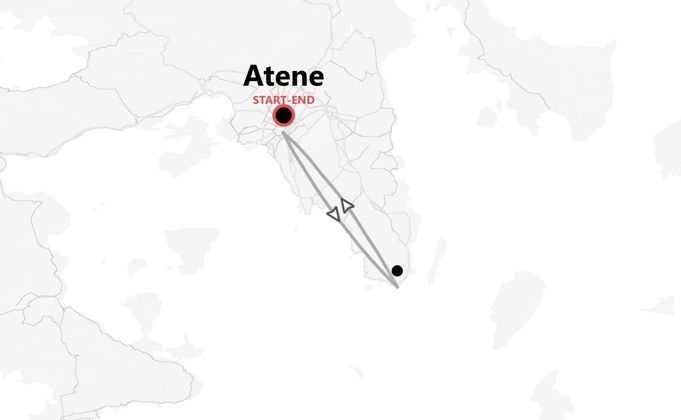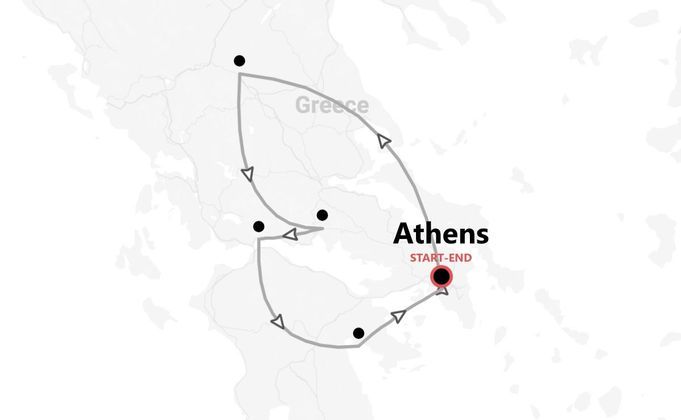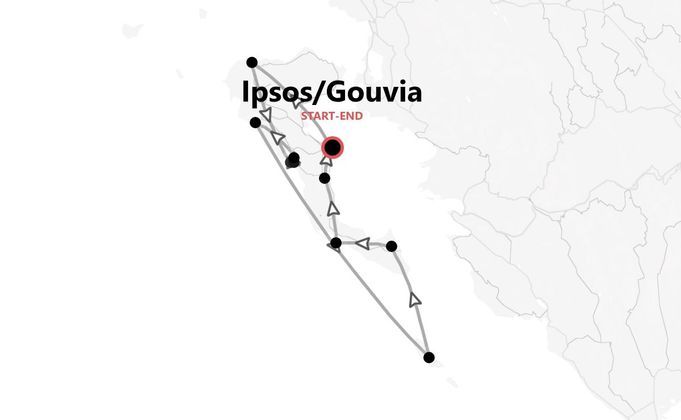
Group trips to Greece
Out organized trips to Greece
Discover the beauty of the Mediterranean with our wide selection of itineraries that cater to all tastes. When it comes to the Greek islands, we have you covered. From the lively and entertaining Corfu and Zakynthos to the more relaxed and picturesque islands of Milos, Santorini, and Kos, there's an island for everyone. If you're in love with the sea, why not consider our sailing trip around Corfu! Whether you're seeking non-stop fun or a more laid-back experience, we have the perfect itinerary for you.
FAQs about Greece
If you are a UK citizen, to find out the entry requirements for Greece, you can check this informational page from our partner Sherpa. If you need a visa, you can apply for it through Sherpa. If you are not a UK citizen, you can still use Sherpa by changing the nationality in the 'Passport' section.
Before traveling, always remember to check the government website of your country of origin for updates on the entry requirements for Greece – you wouldn’t want to stay home due to a bureaucratic detail!
- UK residents: review the FCDO Travel Advice.
- US residents: consult the US Department of State Travel Advice.
- Other residents: refer to your government or local consulate's travel advice.
Greece is in the Eastern European Time (EET) zone, which is 2 hours ahead of the UK and 7 hours ahead of the USA's Eastern Standard Time. For example, if it is 12pm in the UK, it will be 2pm in Greece, and if it's 12pm EST in the USA, it will be 7pm in Greece. Greece also observes daylight saving time, so the time difference may shift by one hour during that period.
Greece uses the Euro (EUR) as its currency. The daily exchange rate can vary, but typically it's around:
- 0.87 GBP
- 1.07 USD
- 1 EUR equals 1 EUR
You can exchange currency at banks, exchange bureaus, and sometimes at hotels. ATMs are widely available if you prefer withdrawing cash.
In Greece, you can pay using credit or debit cards, which are widely accepted in most places, including restaurants, shops, and hotels. However, it's a good idea to carry some cash for smaller establishments or in more remote areas where card payments might not be possible.
ATMs are widely available for withdrawing cash. Make sure to inform your bank about your travel plans to avoid any issues with card transactions while you're there.
In Greece, tipping is appreciated but not mandatory. At restaurants, leaving around 5-10% of the bill is a nice gesture if service was good. For taxi drivers, rounding up the fare or adding a euro or two is common.
In hotels, you might tip porters a euro per bag and leave a small amount for housekeeping. In cafes and bars, you can round up to the nearest euro. Always carry some cash for tips, as it's not customary to add it to credit card payments.
In Greece, if you're from a European country, you can use your current SIM card as roaming is available in the EU, which makes it easy to use your mobile data. However, if you're looking for more data or are coming from outside Europe, purchasing a local SIM card or an e-SIM data plan is a good idea.
Providers like Cosmote, Vodafone, and Wind offer various options. Wi-Fi is quite available in Greece, especially in urban areas, cafes, and hotels, although the speed can be variable in more remote locations.
In Greece, the official language is Greek. Here are a few useful expressions you might hear or want to use during your visit:
- Hello: Γεια σου (Yia sou)
- Thank you: Ευχαριστώ (Efharisto)
- Please: Παρακαλώ (Parakalo)
- Yes: Ναι (Ne)
- No: Όχι (Ochi)
Most Greeks, especially in tourist areas, speak some English, so you'll have an easy time communicating!
In Greece, the plugs used are Type C and Type F. Both types have two round pins. The standard voltage is 230 V, and the frequency is 50 Hz.
If your devices use a different plug type, we suggest you bring a universal adapter to stay connected without any hassle.
The main religion in Greece is Greek Orthodox Christianity. It's a significant part of Greek culture and tradition. Important religious holidays include Easter, which is celebrated with great enthusiasm and unique customs. During Easter, you might encounter various festivities, including church services and local traditions. If you're visiting during this time, it can be a great opportunity to experience these cultural celebrations.
For your trip to Greece, here's a handy packing list to make sure you're all set:
-
Clothing:
- Light t-shirts
- Shorts
- Swimwear
- A light jacket or sweater for cooler evenings
- Casual evening outfits -
Shoes:
Comfortable walking sandals
Flip-flops for the beach
Casual evening shoes -
Accessories and Technology:
- Sunglasses
- A hat or cap for sun protection
- A power bank
- Smartphone and charger
- Camera for capturing moments -
Toiletries and Medication:
- Sunscreen
- Travel-sized shampoo and conditioner
- Toothbrush and toothpaste
- Moisturizer
- Common travel medication like pain relievers, antihistamines, and motion sickness tablets
Greece is generally warm and sunny, so light clothing is key. Don't forget your swimwear for those beautiful beaches!
Greece's weather can vary quite a bit depending on the region and time of year. Here's a quick breakdown:
- Mainland (Athens, Thessaloniki): Hot and dry summers with temperatures around 30°C (86°F), mild and wet winters around 10°C (50°F).
- Islands (Santorini, Crete): Mild winters and warm summers. Summers reach around 28°C (82°F) and winters stay around 12°C (54°F).
- Northern Regions: Cooler with colder winters, sometimes below freezing.
The best time to visit is spring (April to June) and autumn (September to October), when the weather is pleasant and crowds are smaller.







